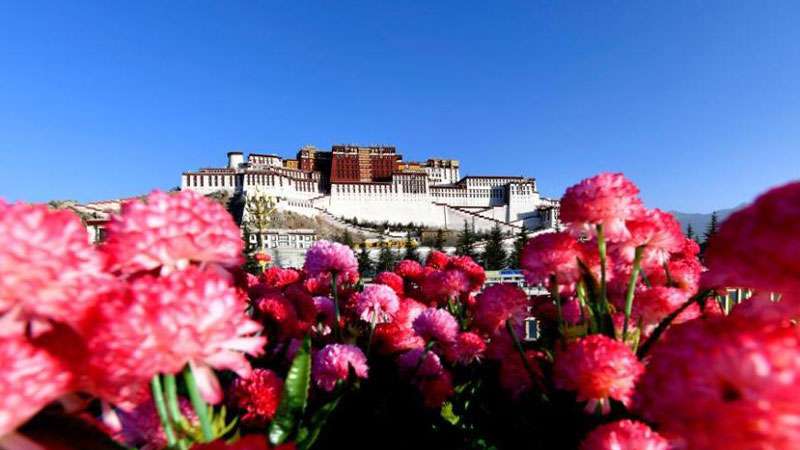China's promotion of harmonious co-existence between man and nature wins worldwide acclaim
BEIJING, Jan. 6 (Xinhua) -- The year 2022 witnessed a series of disasters: In Europe, historic heatwaves had set the tone for this summer, causing some 15,000 deaths; in West Africa, disastrous floods displaced nearly 1.5 million people; and in Southeast Asia and parts of America, a La Nina event caused increased occurrence of climate chaos.
"Humanity has a choice: cooperate or perish," warned UN Secretary-General Antonio Guterres at the Sharm El-Sheikh Climate Implementation Summit in November.
A succession of international conferences on themes covering wetlands conservation, fighting climate change and biodiversity protection were held over the past months as global concerns on ecological environment kept on rising.
China has been committed to advancing ecological progress, planning its development in the context of promoting harmony between man and nature. As Chinese President Xi Jinping has put it, "we must work together to promote harmonious co-existence between man and Nature, build a community of all life on the Earth, and create a clean and beautiful world for us all." China's achievements in ecological conservation and enhancing biodiversity protection are gaining more recognition and acclaim from around the world.
GREEN TRANSFORMATION
With melting glaciers, rising sea levels and more frequent occurrence of climate-related disasters, the Earth has sounded its alarm. Reducing carbon emissions is a pressing task for all nations.
China, the world's largest developing country, has made strenuous efforts to reduce carbon emissions and tackle climate change. A green transformation is taking place here.
From 2012 to 2021, China's carbon dioxide emissions per unit of GDP declined by 34.4 percent, and energy consumption per unit of GDP decreased by 26.4 percent, equivalent to saving of 1.4 billion tons of standard coal.
The country has pledged to have CO2 emissions peak before 2030 and achieve carbon neutrality before 2060, marking the world's biggest cut in carbon emission intensity in the shortest time frame in history.
China has been vigorously promoting energy transformation with installed capacities of hydropower, wind power and solar power generation ranking first in the world. It has become a major producer and buyer of new energy vehicles and established the world's largest carbon market.
According to the International Energy Agency (IEA), China has become the world's largest contributor to the growth of renewable energy capacity.
The country is "expected to account for almost half of new global renewable power capacity additions over the 2022-2027 period," said the IEA in its 2022 annual report.
As progress is being made domestically, China also promotes international cooperation in exploiting renewable energy resources, and pushes forward multilateral collaboration on cutting carbon emissions.
Around 35 km away from Abu Dhabi, the Al Dhafra Solar Project is expected to generate 2 gigawatts of clean electricity for the United Arab Emirates (UAE). This UAE-China cooperative project will help reduce carbon dioxide emissions by 2.4 million tons per year and play an important role in the sustainable development of the UAE's economy.
China's strenuous effort in developing renewable energy to replace fossil fuels has been a "story of hope" in fighting climate change, said Kevin Conrad, executive director of the Coalition for Rainforest Nations.
"China for us is a good example of the types of investment that need to be made. China is showing the world hope," he said.
BIODIVERSITY PROTECTION
Earth is the home shared by us all. It is a sad and worrisome discovery that monitored wildlife populations of mammals, birds, amphibians, reptiles and fish across the globe have seen a devastating 69 percent decline on average since 1970.
There is no time to lose in securing a nature-positive society, the World Wildlife Fund warned in the 14th edition of its biennial Living Planet Report 2022.
"A sound ecosystem is essential for the prosperity of civilization. We must work together to promote harmonious co-existence between man and Nature, build a community of all life on the Earth, and create a clean and beautiful world for us all," Xi said on Dec. 15 when addressing via videolink the opening ceremony of the high-level segment of the second part of the 15th meeting of the Conference of the Parties to the Convention on Biological Diversity (COP15) held in Montreal, Canada.
China, a country with some of the richest biological resources in the world, attaches great importance to ecological conservation. Steadfast efforts have been made to preserve the ecological system and protect biodiversity.
Starting in 2015, the country has launched 10 pilot national parks, including parks dedicated to the protection of Siberian tigers and Amur leopards, as well as giant pandas.
Currently, the at-risk status of wild giant pandas in China has been downgraded from "endangered" to "vulnerable," as their population has grown to some 1,800, and the endangered "smiling angel" Yangtze finless porpoise has been seen in the Yangtze River.
A total of 90 percent of China's terrestrial ecosystem types and 74 percent of key state-protected wild flora and fauna species have been placed under effective protection measures, and the wild populations of over 300 rare and endangered flora and fauna species have been restored and increased.
China holds the presidency of COP15. It held the phase-one meeting in Kunming, capital of southwest China's Yunnan Province in 2021. It chaired the second phase of COP15 in Montreal. Under China's presidency, COP15 has adopted the global biodiversity framework ahead of schedule.
In holding the COP15 presidency, China has shown leadership in global biodiversity protection, Inger Andersen, executive director of the United Nations Environment Programme, has said.
"China has been phenomenal," Andersen said. "I will thank China for its leadership. I think that has been something quite remarkable in complex times. And we have seen China being very steadfast in this regard."
ECOLOGICAL CIVILIZATION
According to World Population Prospects 2022, the global population reaches 8 billion this year. It is an important milestone in human development, and also a test on the stressed ecosystem of the Earth.
The behavior of all human beings and choice of development paths by all nations will determine whether a healthy and sustainable ecological system can be maintained on planet Earth.
With a population of more than 1.4 billion, China is striving to build a modern socialist country in all respects through a Chinese path. The Chinese way values ecological civilization and puts ecological conservation high on the agenda.
The philosophy of harmonious co-existence between man and nature, together with China's efforts to follow it through in collaboration with nations around the globe, has won worldwide acclaim.
Bruno Oberle, director general of the International Union for Conservation of Nature (IUCN), lauded China for spearheading the concept of ecological civilization.
"Indeed, environmental protection, social progress and economic development are inter-dependent and mutually reinforcing," Oberle said, noting that the concept of ecological civilization is also consistent with the IUCN's vision of a just world that values and conserves nature.
"China is sharing this concept with the rest of the world. It's a contribution that China has already been doing for a long time," he said.
Sommad Pholsena, vice president of the Lao National Assembly, commended China for putting harmony between humankind and nature in development planning, saying it assures the world that China seeks a high-quality and green development.
"Ecological civilization is a key element of the current five-year plan (of China), and I think that's good. We in Norway and many other countries are thinking in the same direction," said Norway's Climate and Environment Minister Espen Barth Eide.
Photos
Related Stories
- China issues guideline to strengthen conservation of water, soil
- Pic story: protector of black-necked cranes in SW China's Yunnan
- UN honors China's ambitious ecosystems restoration project
- Chinese researchers “plant” corals on seabed to restore marine ecology
- Bare mountains turn green again through ecological restoration in SW China's Sichuan
Copyright © 2023 People's Daily Online. All Rights Reserved.









